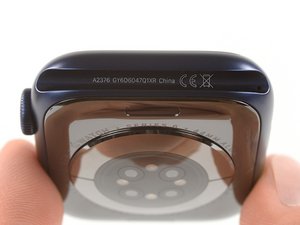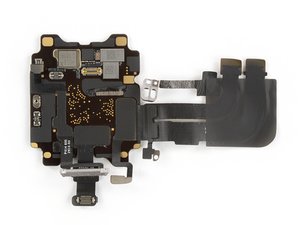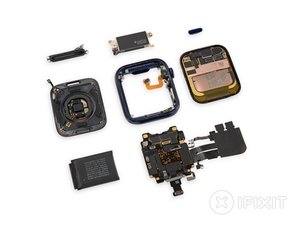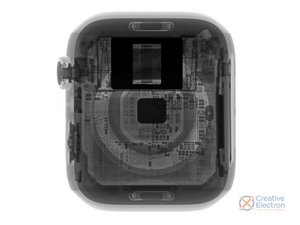By Tobias Isakeit • Difficulty: Moderate
The Apple Watch Series 6 is here to take your breath away—or at least tell you a whole lot about your breathing. We’re pushing our VO2 max just thinking about seeing new sensors (and no finicky Force Touch) inside this latest model, so let’s get our blood pumping with some very small-space exercise.
If you’re keen on getting a glimpse into more gizmos, stay tuned and follow us on Twitter, Instagram or Facebook. If you’d rather get the news straight to your inbox, sign up for our newsletter!



- Outward comparison of the Series 6 (right) with its one-year-old sibling (left) reveals only subtle differences, but that's what teardowns are for. These details we already know:
- LTPO OLED Retina display optimized for always-on functionality—this time without Force Touch
- 64-bit dual-core Apple S6 SiP (System in Package)
- Updated sensor array measuring heart rate, ECG, and now blood oxygen levels
- Compass and realtime altimeter
- Water resistance to a depth of 50 meters



- Underneath the stretchy new watchband, confirmation that this is indeed a new Apple Watch—model number A2376—and not merely some blue-hued lookalike.
- The other band slot features …nothing at all, so our photo editor indulged in a bit of tech fantasy and added a combination lock—as if opening the case could be so easy. Alas, we expect the same ol' opening procedure we perform every year.
- Well, almost the same: In a surprise twist, the Series 6 takes after newer (post-6s) iPhones and opens to the side like a book!
- The procedure is also slightly simplified due to the absence of a Force Touch gasket—a feature now defunct as of watchOS 7.



- Safety first! Let's get this battery disconnected. The connector is still hidden underneath the battery, but a quick flip from an opening pick takes care of that.
- Subtract one tiny tri-point and one teeny bracket and this wee powerhouse is a freed powerhouse.
- The 44 mm Watch cell is rated at 1.17 Wh—a slight increase over the Series 5, but not quite at the level of the 1.3 Wh Galaxy Watch3.
- The smaller 40 mm Series 6 retains the radical metal-pouch design introduced on the Series 5, now with a 1.024 Wh capacity.
- Slowly but surely, Apple Watches seem to be clawing back capacity after the big drop from Series 3 to Series 4.



- The Series 6 features a new, brighter display than the Series 5. It's also brighter on the inside!
- This year's model not only eschews that pesky Force Touch gasket, it also has fewer display connectors to wrestle. The NFC cable is now routed through a display-side jumper—and there's only one grounding cable. We love streamlined design, especially when it simplifies repairs!
- Aside from the aforementioned changes, these displays (Series 5 on the left, 6 on the right) look about the same to the naked eye.
- Teardown update: Here's a closer look at the display, X-ray style. This shows the smaller, 40 mm model's screen, which we stripped apart for our YouTube audience.



- At first glance, the tri-point-trapped Taptic Engine seems old hat—but it turns out to be bigger than the one in the 5. Maybe the slimmed-down Series 4 shaker wasn't up to snuff?
- It's also made using 100% recycled rare earth metals and tungsten this time, which is awesome. (But let's not forget, reuse > recycling.)
- Update: Since we've got Creative Electron's X-rays on tap, here's a nifty bonus image of the Taptic Engine's innards. Shake and bake!
- With all the brawn out of the way, it's time to tackle the brains of this operation: the S6 SiP. Even with our trusty tools, this intricate maze of cabling and hidden screws is no picnic.
- But as usual, time + tools + technique prevails! At last this Watch regurgitates its remaining contents.



- Like most brains, the grey matter in this Series 6 is pretty inscrutable: it's encased in hardened resin, as per usual, making further exploration extremely difficult.
- There are a few more conventional ICs piggybacked onto the package, and we can at least spot a Skyworks chip marked 239-7. The other chips are more mysterious, and none is an exact match for the U1 chip we found in last year's iPhones.
- Sans-brains, we can see the Series 6 frame has a slightly modified footprint with a narrower lip for the adhesive gasket, which is now carefully routed around the band mechanism.
- Apple somehow packed more battery and more Taptic Engine into a (barely) smaller design. Impressive!

- We interrupt this program to bring you some x-ray speculation:
- Processor and memory (SDRAM/NAND Flash) Package on Package
- Power Management IC
- WiFi / Bluetooth SoC
- Microcontroller



- Fused display up top, fused sensor array below—we won't find anything but broken pieces if we bust this apart, so let's switch on those X-rays from Creative Electron again for a better look.
- And here's the (reassembled) pulse oximeter
communicating with alienslighting up in Christmas-y fashion! - Low blood oxygen levels (hypoxemia) can be an indication of COVID-19 or other serious medical issues.
- The Apple Watch doesn't track body temp like the Oura Ring 2 does. But while both measurements are informative, neither is meant to provide hospital-grade certainty.
- As a reminder, we're not health experts—so read up! Find out more about how blood oxygen tracking works at CNET, or a lot more at the Respiratory Medicine journal.


- Leaving all the tiny tri-point screws out of the picture for clarity, we feast our eyes on the latest edition of Apple's
mobile health diagnostic machinetimepiece. - Repair-wise, we're happy to see the fussy Force Touch gasket gone, and only two fragile cables tethering the display.
- Thicker rubber-like adhesive on the display and back plate also safeguards the watch against unwanted ingress (or in our specific case, wanted ingress).
- They just keep polishing this thing to a higher and higher gloss and it’s almost sneaky how much of it they don’t tell you about, keeping all the focus on the whiz-bang health features.

- The Apple Watch Series 6 earns a 6 out of 10 on our repairability scale (10 is the easiest to repair):
- Screen replacements are difficult but possible. The screen is the first thing to come off, and detaches via ZIF connectors.
- Battery replacements are reasonably straightforward, once you're inside.
- Tiny tri-point screws throughout the watch can be difficult to remove and keep track of.
- Several component flex cables are mounted directly to the S6 package, requiring skilled microsoldering to replace if they are torn.